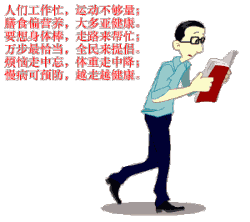
FRIDAY, Sept. 2, 2016(合众国际社 UPI) 一项新的研究发现,过度饮酒和年龄增长易患常见的心律失常因此增加中风的风险。
瑞典斯德哥尔摩卡罗林斯卡医学院的一名心脏病专家Faris Al Khalili 说:临床医生应该询问房颤患者的饮酒情况,并建议他们减少饮酒。
这项研究包括超过25000、年龄在18~64岁的瑞典成年人。这些房颤患者没有瓣膜问题。这种房颤额外增加了中风的几率,被认为是低风险的缺血性中风(阻断血液流动到大脑)。
在随访五年中研究人员发现增加脑卒中的两个显著相关因素:与酒精相关的住院治疗比例(约增加了一倍)和年龄。
研究显示血液稀释药物的使用与降低卒中风险也呈相关性。他补充说,这些患者的血液稀释药剂和中风之间的利弊关系需要进一步的研究,如出血问题。
Al Khalili在新闻发布会上说:“尽管这些患者分类为低风险的,但作为一个社会人群的缺血性卒中的发病数是不可忽略的,它有一个较高的死亡率”。
酒精是房颤-卒中的独立危险因素,但目前的研究还不能证明是直接的因果关系。研究人员说:不能低估滥用酒精与住院治疗问题的严重性,并建议要控制酒精的摄入量。
FRIDAY, Sept. 2, 2016 -- Excessive alcohol consumption and age may increase risk of stroke in people with a common heart rhythm disorder called atrial fibrillation, a new study finds.
"Doctors should ask their [atrial fibrillation] patients about alcohol use and advise patients to cut down if they are drinking more than is recommended," said Dr. Faris Al-Khalili, who led the study. Al-Khalili is a cardiologist at Karolinska Institute in Stockholm, Sweden.
The study included more than 25,000 Swedish adults, ages 18-64, with atrial fibrillation that wasn't related to valve problems. Atrial fibrillation increases odds of stroke, but because these patients had few additional risk factors, they were considered at low risk for ischemic stroke (blocked blood flow to the brain).
Over a follow-up of about five years, the researchers found two factors were significantly associated with increased stroke risk: alcohol-related hospitalization -- which doubled risk -- and age.
Use of blood-thinning medication was associated with a lower risk, according to the study presented Saturday at the annual meeting of the European Society of Cardiology, in Rome.
"Even though these patients are classified as low-risk, the incidence of ischemic stroke in our study population is neither negligible nor ignorable and it carries a relatively high mortality," Al-Khalili said in a society news release.
"Our study found that alcohol is an independent risk factor for stroke in patients with [atrial fibrillation]," Al-Khalili said.
How the relationship works isn't clear, however, and the study was observational, meaning it can't prove a direct cause-and-effect relationship.
Alcohol might induce atrial fibrillation, leading to stroke, or there could be a specific alcohol effect that causes systemic or cerebral clots, the researchers suggested.
"Using alcohol-related hospitalization as a proxy for alcohol abuse likely underestimates the extent of the problem, and does not allow grading of the amount of alcohol consumed," Al-Khalili said.
He added that the beneficial link between blood thinners and stroke in these patients needs further investigation, particularly with respect to benefits versus harms, such as bleeding.
Research presented at meetings is usually considered preliminary until published in a peer-reviewed medical journal.




